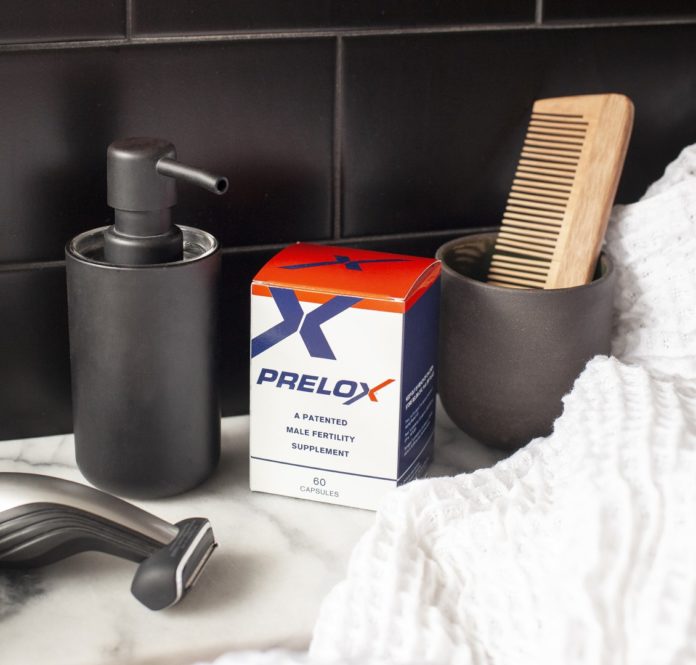Struggling to fall pregnant? There’s a 50% chance the problem lies with him. But it’s treatable: here’s how Prelox boosts male fertility.
Having a baby is one of the most intense emotional experiences any human can have. No matter the circumstances, we always respond to falling pregnant with emotion first: the joy of announcing your pregnancy, the surprise of an unplanned one, the sombre sigh when it’s just not happened for you yet. Sadly, a growing number of couples worldwide experience infertility at some point or another, with male fertility issues surprisingly making up half of these cases – which is why you should know about the remarkable effectiveness of male fertility supplement Prelox.
Infertility affects 1 in every 10 couples
It’s estimated that 10% of couples struggle with infertility (some studies even say it’s as high as 12%). That’s a huge number of people, with signs pointing to that percentage potentially growing in the future due to our ever-evolving lifestyles and environment.
But, despite infertility being so common, there’s still a stigma that surrounds it. We still view infertility as a largely female problem. The truth, however, is that men are just as likely to be infertile as women are.
Men account for up to 50% of infertility cases
Numerous studies have concluded that male fertility contributes to half of all cases of infertility in couples. And yet, men are much less likely to seek help. This is not a new trend; numerous surveys and studies have found that men are generally less likely to seek help for anything ranging from mental health issues to problems in the workplace. Men are even less likely to schedule a normal doctor’s visit when they’re sick.
But this information does drive one important point home: for any couple struggling to conceive, it’s vital that both the man and woman come together, talk openly about it and seek help together (you might recall that male fertility supplement Prelox®’s campaign centres on the concept that it Takes 2 To Make a Family, an axiom that continues to ring true for anyone trying to conceive). Interestingly, though, a large number of male infertility cases are due to one very common factor: sperm health.
Most male fertility problems stem from (totally treatable) sperm health
By far the most common factor in male fertility is the quality, amount and motility (ability to move and perform its usual functions) of the sperm. We jokingly refer to sperm as his little swimmers, but often don’t realise just how demanding it is for a single sperm to make it all the way to fertilise the female egg.
His sperm are tiny – a million of them could fit on the head of a pin. And, on average, they need to “swim” about 18cm to fertilise the egg. To put that into perspective: for a sperm to reach the egg requires the same amount of stamina a human would need to swim across the Atlantic Ocean (roughly 6 000km). What’s worse, his sperm is constantly under “attack” from processes that promote oxidative stress in his body.
Oxidative stress destroys his sperm
Remember how we said that our ever-evolving lifestyles and the environment contribute to infertility? It’s true. Think the exposure to environmental elements through technology, compounds and chemicals in the world around us. Think increased stress in the workplace, our communities, our countries and the world at large. Think about how we are having children later in life than our ancestors did.
All of these elements either directly or indirectly contribute to driving changes in our bodies, damage in the form of free radicals and oxidative stress – which have a dramatic impact on fertility. Cellular damagers known as reactive oxygen species (ROS) are linked to all kinds of health issues, from sun damage and ageing to illness and even acne. But it has a devastating effect on cells as specialised and important as a man’s sperm. ROS creates a toxic environment for sperm and disrupts their normal growth and function on a massive scale.
How oxidative stress damages sperm:
- It damages the sperm’s “head” membrane, which is vital for fusing with the egg, making fertilisation impossible.
- It damages the vital DNA that sperm carries with it, hindering fertilisation – this can even affect the baby’s development.
- It breaks down the sperm’s natural defences, leading to damaged (and fewer) sperm that can’t complete the necessary journey.
- It damages the sperm’s tail, stopping it from being able to swim.
What can we do to counteract oxidative stress?
Getting together and realising that male fertility is not “his fault” but rather due to complex biological and environmental damages is a good first step. And actually fighting oxidative stress to promote male fertility involves creating a healthier lifestyle. This means everything you may already be thinking: eating healthy, getting lots of exercise, avoiding alcohol and tobacco, managing stress and generally working on living better.
Looking at sperm health in particular, though, it’s important to note that excessive heat is not good either. So, bathing and showering in lukewarm water (as opposed to very hot), wearing looser-fitting underwear and avoiding electric blankets are all important. Also, you might be happy to know that having sex more often is good for sperm health. Yes, you read that right. Consider it “doctor’s orders” to have sex at least every 2 to 3 days (you’re welcome!).
The boxing-clever way to treat male infertility safely and effectively, though, is talking to your doctor. There have been some amazing advances in medical science and treatments recently. For example, a recent study by Stanislavov et al found truly incredible increases in sperm health in men taking male fertility supplement Prelox® for just one month.
Prelox dramatically boosts sperm health
Prelox is a remarkable male fertility booster, brought to you by the pharmaceutical component of Lamelle Research Laboratories. And its effectiveness in treating male infertility is nothing short of astounding.
In the recent double-blind study, 50 men with an average age of 36 suffering from mild infertility were given two tablets of Prelox for one month. Of course, there were loads of before and after tests, placebo tests and various groups tested at various times and intervals. In the end, the study showed that taking Prelox for one month:
- Increases the number of healthy sperm by 150%
- Boosts the concentration of healthy sperm by 83%
- Results in 55% better motility (mobile/ability to move) in sperm
- Generates 93% more healthy, normally formed sperm
The best part? Prelox delivers these significant improvements in male fertility with no side effects.
How Prelox works
Since the main damager to sperm health is oxidative stress, Prelox combines the power of notable antioxidant Pycnogenol® and the amino acid L-Arginine. As the name suggests, antioxidant Pycnogenol neutralises the ROS that cause oxidative stress. L-Arginine stimulates the body’s creation of endothelial nitric oxide (e-NOS) which dramatically boosts sperm health. Taken together in the form of two tablets per day, Prelox delivers a remarkable increase in sperm health in four weeks.
Where can you get Prelox?
It’s always a good idea to consult your doctor together. He or she will know Prelox and will recommend it if it’s right for you. Prelox is available for purchase at all major pharmacies and chains for around R635.52. But you can also buy Prelox directly online at Lamelle Pharma Store www.lamelle.co.za






